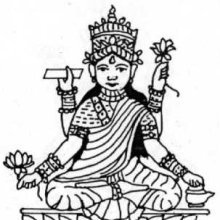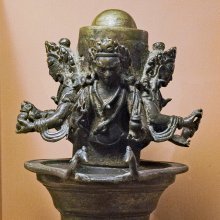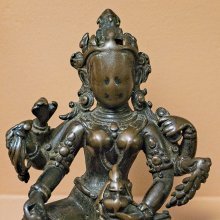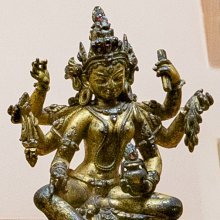Water-jar, Water-pot: 2 definitions
Introduction:
Water-jar means something in Hinduism, Sanskrit, Jainism, Prakrit. If you want to know the exact meaning, history, etymology or English translation of this term then check out the descriptions on this page. Add your comment or reference to a book if you want to contribute to this summary article.
Images (photo gallery)
(+5 more images available)
In Hinduism
Vastushastra (architecture)
Source: Shodhganga: Elements of Art and Architecture in the Trtiyakhanda of the Visnudharmottarapurana (vastu)Water-jar-shaped Temples (in ancient Indian architecture) are denoted by the Sanskrit term Ghaṭa, as described in literature such as the Viṣṇudharmottarapurāṇa, an ancient Sanskrit text which (being encyclopedic in nature) deals with a variety of cultural topics such as arts, architecture, music, grammar and astronomy.—It is quite difficult to say about a definite number of varieties of Hindu temples but in the Viṣṇudharmottarapurāṇa hundred varieties of temples have been enumerated. For example, Water-jar-shaped. These temples are classified according to the particular shape, amount of storeys and other common elements, such as the number of pavilions, doors and roofs. [...] The Viṣṇudharmottarapurāṇa relates that the temple named Ghaṭa should be constructed in the shape of a Water-jar.

Vastushastra (वास्तुशास्त्र, vāstuśāstra) refers to the ancient Indian science (shastra) of architecture (vastu), dealing with topics such architecture, sculpture, town-building, fort building and various other constructions. Vastu also deals with the philosophy of the architectural relation with the cosmic universe.
In Jainism
General definition (in Jainism)
Source: Singhi Jain Series: Ratnaprabha-suri’s Kuvalayamala-kathaSprouted water-jars refers to one of the various attributes held by the Eight auspicious Girls (representing the eight celestial nymphs of Indra’s heaven) (also: aṣṭakanyā), according to Uddyotanasūri in his 8th-century Kuvalayamālā (a Prakrit Campū, similar to Kāvya poetry).—Page 93.17-8: There is a list of Eight auspicious girls holding respectively sprouted water-jars, fan-palm, fly-whisk, parasol, mirror, mṛdaṅga, harp, drum and cloth and ornaments. These were regarded as eight celestial nymphs of Indra’s heaven and frequently referred in literature as aṣṭakanyā or sabhā-kanyā. [...]

Jainism is an Indian religion of Dharma whose doctrine revolves around harmlessness (ahimsa) towards every living being. The two major branches (Digambara and Svetambara) of Jainism stimulate self-control (or, shramana, ‘self-reliance’) and spiritual development through a path of peace for the soul to progess to the ultimate goal.
See also (Relevant definitions)
Partial matches: Pot, Water, Jar.
Full-text (+458): Kamandalu, Alinjara, Kalasha, Karkari, Kudika, Kumbha, Alu, Gaduka, Vrinta, Amakumbha, Udakumbha, Kundika, Kusumbha, Mahabila, Vardhani, Vahsadana, Karkarika, Manika, Ninahya, Gadu.
Relevant text
Search found 131 books and stories containing Water-jar, Water-pot; (plurals include: jars, pots). You can also click to the full overview containing English textual excerpts. Below are direct links for the most relevant articles:
Vaisheshika-sutra with Commentary (by Nandalal Sinha)
Sūtra 3.1.6 (The body or the senses are not the seat of perception, continued) < [Chapter 1 - Of the Marks of Inference]
Sūtra 3.1.5 (The body or the senses are not the seat of perception, continued) < [Chapter 1 - Of the Marks of Inference]
Sūtra 1.2.1 (Causation) < [Chapter 2 - Of Genus and Species]
The Shiva Purana (by J. L. Shastri)
Chapter 17 - The rules governing Śaivite initiation < [Section 7.2 - Vāyavīya-saṃhitā (2)]
Chapter 32 - The rites for achieving worldly benefits < [Section 7.2 - Vāyavīya-saṃhitā (2)]
Chapter 36 - Installation of Śiva < [Section 7.2 - Vāyavīya-saṃhitā (2)]
Amarakoshodghatana of Kshirasvamin (study) (by A. Yamuna Devi)
Daily Life (4): Household Articles < [Chapter 3 - Social Aspects]
The Brihaddharma Purana (abridged) (by Syama Charan Banerji)
Chapter 38 - History of Ganga (continued, 2)
Chapter 13 - On the sanctity of the Naimisharanya forest
Harshacharita (socio-cultural Study) (by Mrs. Nandita Sarmah)
19. Description of Utensils < [Chapter 6 - Other Socio-Cultural Aspects]
Dhammapada (Illustrated) (by Ven. Weagoda Sarada Maha Thero)
Verse 122 - The Story of Bilālapādaka < [Chapter 9 - Pāpa Vagga (Evil)]
Verse 121 - The Story of a Careless Monk < [Chapter 9 - Pāpa Vagga (Evil)]
Verse 61 - The Story of a Resident Pupil of Venerable Mahākassapa < [Chapter 5 - Bāla Vagga (Fools)]
Related products






